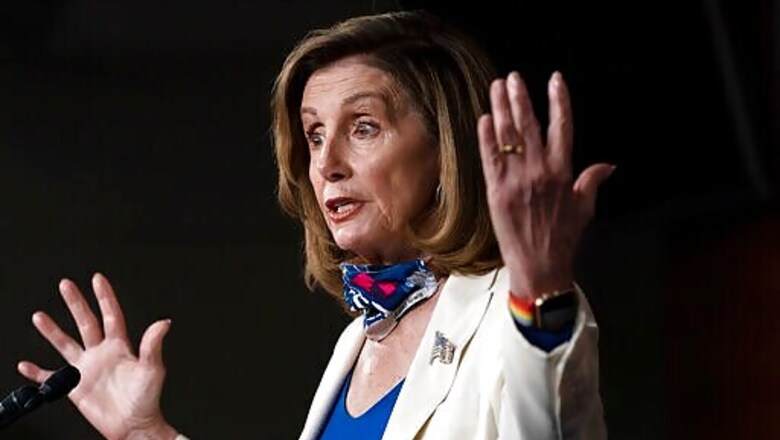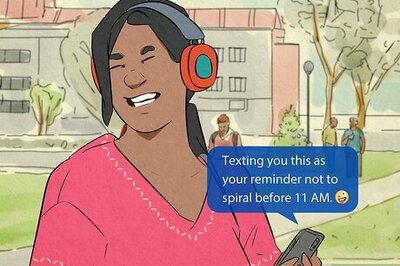
views
WASHINGTON: Congressional leaders said Friday they are taking a fresh look at requiring virus testing on Capitol Hill after President Donald Trump’s virus infection revived fears of an outbreak in the close, increasingly tense quarters of the House and Senate.
Just hours after news of Trump’s diagnosis shook Washington and the 2020 campaign, Sens. Mike Lee, R-Utah, and Thom Tillis, R-N.C., became the latest members of Congress to test positive for the virus that has killed more than 205,000 Americans. All three attended the White House Rose Garden introduction Saturday of Trump’s nominee for the Supreme Court, Amy Coney Barrett.
As Trump’s campaign canceled or postponed in-person events, anxiety spiked on Capitol Hill, where testing and tracing is offered, but not required, for anyone who thinks they may have been exposed to COVID-19.
We simply cannot allow the administrations cavalier attitude to adversely affect this branch of government,” said Senate Minority Leader Chuck Schumer in a statement. “It is imperative that all results be made public in order to contain a possible outbreak and so we can determine the need for senators and staff to quarantine or self-isolate.
House Majority Leader Steny Hoyer said he spoke with House Speaker Nancy Pelosi Friday morning about boosting or requiring testing in the Capitol.
We havent made a decision on that. In light of that we need to consult with our medical people, Hoyer, D-Md., told reporters. He said one concern was doing reliable tests.
Later, Pelosi’s office referred to a statement from the Capitol physician reiterating the current policy.
The dilemma facing Congress remains similar to what confronts schools, houses of worship, workplaces and the White House as the virus rampages across the United States. Nationally and on Capitol Hill, there are no comprehensive plans requiring testing or wearing masks.
For months, leaders in Congress have resisted boosting the voluntary testing system there or accepting tests from the White House, saying supplies should go to frontline workers and the rest of America. But they’ve taken other precautions. The Capitol has been closed to visitors since March, and most offices and committee hearings are at least partially conducted remotely. House members can vote by proxy through their colleagues, to cut down on the number of people milling around.
But Capitol Hill remains a potential disease vector by any measure. Its a warren of tunnels, parlors, tiny elevators and odd staircases traversed by chatty lawmakers who have flown in from all over. Many members are older and more vulnerable to infection. A few Republicans have refused to wear masks at times.
The potential for the virus to spread was abundant just in the last few days. Barrett visited with dozens of senators, including Lee and Tillis, ahead of her confirmation hearings expected to begin Oct. 12.
Both men are members of the Senate Judiciary Committee that will handle Barrett’s confirmation hearings. Lee, Tillis and other Republican members of the panel were among those who attended the Rose Garden event on Saturday. Photographs of the event show very few people wearing masks.
Several members of Congress attended the first presidential debate Tuesday in Cleveland, where members of the president’s family removed their masks during the 95-minute exchange. And then there was Friday’s House session.
Trump’s diagnosis amped up the atmosphere.
I think its time my colleagues who are, you know, denying the science to, you know, stop their flat earth nonsense and, and protect themselves and others,” said Rep. Sean Patrick Maloney, D-N.Y.
Everyone in the Capitol complex needs to be tested, tweeted Sen. Chris Murphy, D-Conn. Every Republican Senator or staff member who was in close contact with Trump needs to quarantine. No business should proceed in the Senate until we understand the scope of this crisis.
Republicans were far more muted on the need for additional COVID precautions.
Rep. Brad Wenstrup, R-Ohio, a podiatrist, pointed out that some tests have been unreliable. Asked if his colleagues should wear masks more often, he replied, It would help.
___
Follow Kellman on Twitter at: http://www.twitter.com/APLaurieKellman
Disclaimer: This post has been auto-published from an agency feed without any modifications to the text and has not been reviewed by an editor



















Comments
0 comment